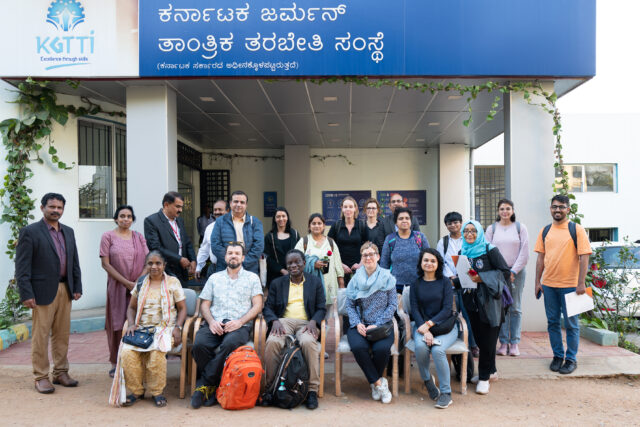From the 12th to 19th February 2023, 12 SMUS partners/associates participated in a GIZ-DAAD Pilot Project on Urban Sustainability and Green Cities in India, organised by the GIZ Sector Project on Education. The group were joined by several delegates from the GPN Exceed network. This intense networking week brought SMUS scholars and young scientists together with GIZ (German Agency for International Cooperation) projects and other development cooperation organisations. The pilot project aimed to initiate an exchange between the two worlds of technical cooperation projects and academia to understand each other better and ideally generate mutual benefits.

Visited projects/institutes:
- Karnataka German Technical Training Institute, Bengaluru – Indo-German programme for Vocational Education and Training II (IGVET II)
- Bosch Smart Campus, Living Lab Bengaluru, Green Urban Mobility Innovation
- Fraunhofer Institute, Bengaluru
- GIZ Project Sustainable Urban Development – Smart Cities II (SUD-SC II) (Kochi, virtual)
- ELCIA (Electronics City Industries Association): Smart City Project, Bengaluru
- GIZ Project Climate Smart Cities (Kochi, virtual)
SMUS partners/associates:
- Upasana Bhattacharjee, PhD Candidate, former SMUS junior research fellow, University of Toronto, Canada – Urban Media and Queer Theory
- Prof. Ilana Boltvinik, Universidad Veracruzana, Mexico – Interdisciplinary Art-based Research in Urban Environments, Waste
- Lina Bose, PhD Candidate, IIT Kharagpur, India – Critical Heritage Studies, Environmental History
- Dr.-Ing. Andreas Brück, TU Berlin, Germany – Urban Planning, Visualisation and Communication of the Urban
- Dr.-Ing. Katleen De Flander, SMUS Coordinator, TU Berlin, Germany – Urbanism
- Prof. Wiwandari Handayani, Diponegoro University, Indonesia – Urban and Regional Planning
- Aishwarya Isha, PhD Candidate, IIT Roorkee, India – Inclusive Urban Design
- Prof. Angela Million, SMUS Director, TU Berlin, Germany – Urban and Regional Planning
- Prof. Jenia Mukherjee, IIT Kharagpur, India – Urban Environmental History, Urban Political Ecology and Transdisciplinary Waters
- Prof. Gaurav Raheja, IIT Roorkee, India – Architecture and Urban Planning
- Ankita Sood, Consultant, GFDRR, World Bank – Climate and Disaster Resilient Planning
- Dr. Megha Tyagi, former SMUS Post-Doc fellow, TU Berlin, Germany – Urban Planning
The following colleagues accompanied us for the duration of the week:
- Shaban Mayanja, GIZ, Germany – Sector Project on Education
- Lars Gerold, DAAD, Germany – Head of Section Development Cooperation, Institutional Building in Higher Education
- Elisabeth Tuider, GPN Exceed network, University of Kassel, Germany – Sociology of Diversity
- Lakshya Yog, GPN Exceed network – ActionAid Association India – Policy and Research, Urban Studies
Some impressions from our SMUS group:
“It has been a very informative and thematic-widespread introduction to the work of GIZ in India. I see big potential to cultivate this introduction to a true GIZ-DAAD exchange.” (Angela)
“The DAAD-GIZ event lived up to its vision of networking, for I made many valuable connections and forged some new friendships as well. A relaxed and informal atmosphere throughout the event allowed for some truly engaging and stimulating conversations over matters of concern. Overall, I loved every bit of it, and being a part of it was an honour.” (Ankita)
“On one hand, the intense interaction of all participants during one week was a magnificent way to create fabulous bonds and interchange analytical thoughts. On the other hand, this first encounter between two general ways of framing cities and their sustainability (GIZ-DAAD) enabled me to better comprehend the means in which they could collaborate in the future. Having access to the framework of the visited sites, particularly ELCIA, permitted insights to the preoccupations that shape implementations in the present and future. I am very grateful for this opportunity.” (Ilana)
“The GIZ-DAAD networking week was eye-opening in terms of exposure to the (inner) technical worlds of urban designs and data management through presentations on and visits to urban living labs such as ELCIA and Bosch. For urban ecological social scientists–critically interrogating tech-heavy, capital-intensive SMART urban applications and models–, the GIZ-DAAD events unleashed both cherishable and apprehensive moments, generating research curiosity on conducting first-hand empirical explorations across the various components of these urban laboratories.” (Jenia)
“The GIZ-DAAD networking week succeeded in making everyone aware of how different these two worlds are in their approach to urban sustainability, in their ways of working, in their use of language, etc. I hope that the lessons learned from this pilot week will be used to their best potential since the goal of bringing these worlds in conversation with each other is an excellent one. Bringing the right people together before setting theme and location, is I believe a crucial step for the hopefully next endeavour.” (Katleen)
“As a young professional currently transitioning from academia to industry, the GIZ DAAD networking week was immensely beneficial in two ways: first, the opportunity to understand the on-ground initiatives undertaken by GIZ with multi-sectoral partners, especially in the urban development sector in Bengaluru and Kochi. Second, it acted as a positive catalyst in fostering valuable exchange among participants from diverse backgrounds. Overall, I am grateful for the opportunity and believe such events have the potential to explore meaningful ways of collaboration between academia and industry.” (Megha)
“The networking week introduced and embedded us in different kinds of infrastructural and development projects that are underway, and as academia often analyses such projects from the outside, it was interesting to actually hear from people planning and working on these projects. It also proved to be a great space to exchange ideas and critically engage with each other’s work!” (Upasana)
“The DAAD-GIZ event provided me not only information about the work and scope of activities of some German institutions in general and in India in particular, but also gave me the opportunity to discuss various interesting things in a very nice atmosphere to be able to develop innovative initiatives and expand networks to promote better and sustainable cities. Looking forward to having any follow up, to transform these ideas into concrete works…!!!” (Wiwi)






